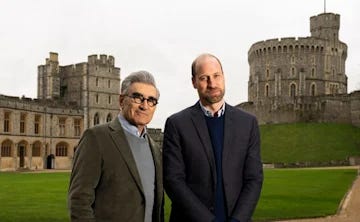Why Prince William needs some quick wins
Royal Clubber Audrey Symes returns with her reaction to the Prince's revelatory Eugene Levy interview
Hi fellow Royal Clubbers, it’s Audrey.
After watching Prince William outline his manifesto for monarchy to Eugene Levy in The Reluctant Traveler, l was struck by the daunting challenge he has set himself: to modernise the monarchy while staying true to its historical roots.
In a previous post I posited how state visits might evolve without losing their reverence for the past, and William’s challenge is to strike this balance across the entire institution. He needs to show not just leadership but partnership with those he serves, which will require outreach, responsiveness, and a readiness to accept evaluation.
So how might this look in terms of creating the impact that he clearly values?
Through his signature initiatives – Earthshot and Homewards – William has embraced the unique royal role of convenor, influencer, and fundraiser. These are visionary projects, but they are also long-term endeavours, with relatively infrequent milestones.
To complement them, he could benefit from initiatives that deliver more immediate, visible results. Essentially, he needs some quick wins.
A series of grassroots listening tours at village halls and community centres across the United Kingdom, for instance, would allow him to meet communities with no agenda other than to listen – to hear first-hand the hopes and frustrations of everyday life.
Tangible benefits
From those encounters could spring small, tangible acts of support: smaller-scale projects to improve local conditions and community life through William’s reach and royal magic.
Based on his listening tours, William could develop and promote ambitious yet accessible volunteer campaigns like organising the assembly of 100,000 toiletry kits for the homeless or for new parents in need across the country, to demonstrate that royal presence brings tangible benefit.
With corporate partnerships and community involvement, especially for projects in which whole families could participate (perhaps coordinated as multiple simultaneous events, a few of which William and his family could attend), these efforts would expand reach and show collaborative leadership. He could even create an office within his household for impact reporting, with digital dashboards to track outcomes on a regular basis and demonstrate his commitment to responsible management and recognition of the importance of all levels of public engagement.
As his comments suggested, William’s opportunity lies not in reinventing the Crown but refreshing it to reveal its continued relevance. William has an extraordinary opportunity to make the monarchy feel not just aspirational but personal – to make people feel seen, to show that the Crown is not only a symbol but a partner in progress in issues both great and small.
Further reading
Should King Charles cut Prince Andrew loose?



